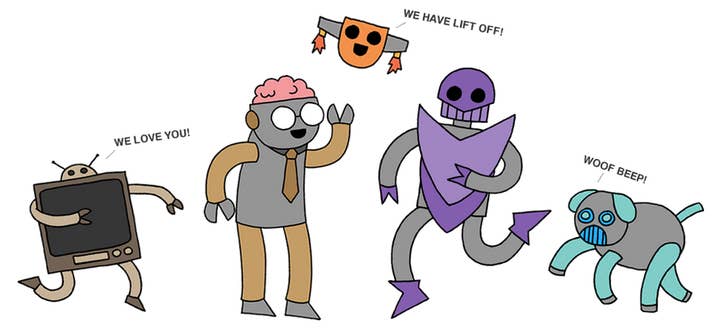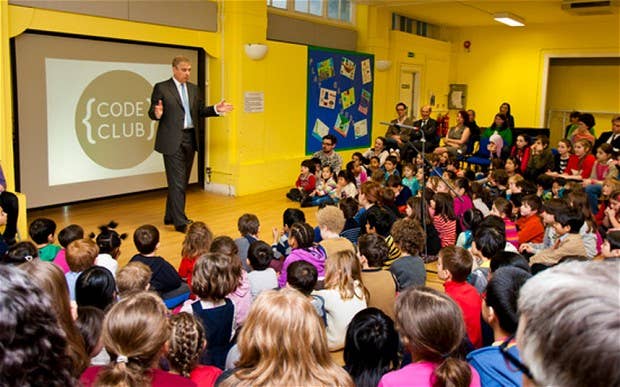CodeClub: 30,000 kids and counting
MD Laura Kirsop on her mission to teach CSS, HTML and Python to 9-11 year olds
When I was nine years old, my programming skills amounted to being able to encourage my Spectrum to print crude, flashing expletives on-screen, gradually increasing in severity until the terror of being discovered got the better of me. I'm not sure I ever progressed any further than grade 'idiot-face'. I spent a little time tooling around with BASIC, either painstakingly copying out code from magazines, or toying with inscrutable graphical blocks and all-caps commands, but I never really got behind it. It was tough, bewildering and, for one as unskilled as I, pretty unrewarding. Plus, there was always a game of Chaos to be played instead. Predictably, in fairly short order I decided that programming was stupid and impossible and I never went back.
I've regretted it ever since.
Without wanting to sound bitter, children today have a much better chance of finding their way into the code workshop behind the gaming theatre. There are tools which make it much easier to turn imagination into fact, powerful computers at every desk, complete with mice, internet and more than eight colours. More importantly, though, there are women like Laura Kirsop.
Laura is the MD of CodeClub, an after-school organisation which aims to bring coding to children across the country. By bringing in volunteers and training teachers, Kirsop's organisation has imbued thousands of 9-11 year olds with the skills and creativity to ensure that industries like ours have a bright and exciting future, beyond printing 'bumbreath' 80 times in a row. I caught up with her as CodeClub prepares to enter its next phase: teaching those who teach.
Firstly, congratulations. CodeClub has become a pretty major organisation over the recent months, just how wide is your reach, and what are your immediate aims?
In short, it's been going extremely well. We started in September 2012 with just 120 clubs and after a year reached a thousand. Now, less than two years later, we've had over 2100 clubs registered and there's about 15 kids in each club, on average. So I haven't done the sums recently but it's over 30,000 children that have been taught to code as part of the Code Club which is extremely awesome.
The main challenge we're facing in the organisation is getting the number of volunteers that we need. So at the moment we have over 700 schools that are registered as wanting Code Club and needing a volunteer. So our main issue in terms of scaling Code Club up and reaching as many children as we possibly can is finding volunteers.
Who are the volunteers?
It's a huge mixture. Over half our volunteers are from outside of the school itself, so they'll be people that know how to programme. So they could be working in a professional capacity, but some people are retired or hobbyists who are also parents of kids in school. I think about 40 per cent of our clubs are run by somebody within the school and that could either be a teacher, a teaching assistant, or quite often it's the IT technician or something like that. So there's a huge variety of people running clubs but I think our main focus really now, because obviously there are so many schools that don't feel that they can run it in-house or run it with somebody from their existing school community, we're really looking for those kind of professionals from the games industry, tech industry, to get involved and help out.
"we're really looking for those kind of professionals from the games industry, tech industry, to get involved and help out"
How hard has it been to find those teachers? Are you finding enough?
The two biggest challenges we face are people thinking they can't get time out of work to do it, which isn't really generally the case. We find that once people are brave enough to go to their boss and suggest they have time out of their working week where they take a couple of hours, we find generally companies are really supportive. Especially tech companies, because they see it as a good way to invest in the social capital of their community. And obviously the kind of cynical angle is those kids in Code Clubs could be their future employees, so they tend to get behind it really.
How about the kids? Are they easily convinced?
I think convincing the kids is the absolute easiest part! Almost every single club that's running is over-subscribed. We pitch the idea of the club to the kids rather than just adding it on the generic list of after-school clubs that they have. Then it's first come, first served and at almost every single club we hear people saying there's a waiting list and there are ten more kids that want to come. So it's extremely popular.
We provide our volunteers with a presentation they can use to introduce it to years 5 and 6 in assembly and it just sort of says 'you like playing computer games? How about making them?' and that's really all the encouragement they need.
Why should this have to be an extra-curricular thing? Would you like to see it integrated into the official programme?
When Code Club first started it was before the advent of the new curriculum, so at that point we were meeting this gap: everybody had decided that the old ICT curriculum wasn't fit for purpose and there was the move towards coding and computing, but nobody quite knew what it would look like and how to do it.

Now we do have the new curriculum coming in in September and schools are in various degrees of preparation for it. I think the Code Club will always run alongside and complement the statutory curriculum: you teach all kids music, but you still have an orchestra. It's always worth having that kind of compulsory curriculum because that means it reaches more children but also have that special, slightly different, after-school extra curricular setting too, for those that are particularly interested or gifted.
Games are obviously a good way to get kids' attention, but is that the entirety of the program?
We definitely start them off making games, we find that a really effective hook for them. All of our projects are designed to be made within an hour, it's very immediately gratifying for the kids. Literally, by the end of their first Code Club they leave having made their own game. Obviously a very, very simple game in Scratch. So we definitely try and focus on that in the beginning and then we broaden out with the Scratch projects to make animations and different kinds of apps. Lots of different interactive stuff and then after they've got super familiar with Scratch and programming concepts, we move them on to web dev stuff. So they're learning HTML, CSS and/or then Python. And we're currently working on more exciting Python stuff which has some game design elements and also some Javascript stuff.
What about certification? Do you provide any grades?
We have certificates that children get given at different stages. So they complete levels of projects and get certificates for those. We are moving towards using an e-badging system through Mozilla's open badges, so by the end of the year we'll have that implemented so our volunteers and teachers will be able to award their students badges to recognise that they've mastered a particular principle and they'll be able to keep those in an online portfolio which they can take with them if they wish to through the rest of their learning life.
9-11 is a fairly narrow aqe group - what made you choose that bracket?
I think it's been really helpful for us to target a particular age group at the beginning. We're obviously a tiny tiny team and writing projects takes an awfully long time. So in terms of practicality it's really useful to have an age range in mind when you're writing materials.
"we're hoping that they keep with it so once they get to 11 that's not the end, they'll keep on going"
I think we started with the 9-11 age range because they're young enough to be excited and malleable in the sense that they probably at that age don't have any preconception of what programming is - who it's for and who it's not for. So you're able to get in while they're still young and eager to learn. And we're hoping that from being in Code Club at that age, they are then hooked on digital making and they'll pursue other things. We signpost them onto things like Young Rewired State and CoderDojo and things like that. So we're hoping that they keep with it, so once they get to 11 that's not the end, they'll keep on going. But we also say that the age range is just a recommendation really, so the projects are written with that age group in mind but if you've got a younger kid that's really good at reading they'll be able to access the projects. Or if you've got an older kid that's never done any programming they'll also be suitable. It's a guideline rather than a dictatorial thing.
The gender gap in tech and games programming is proving to be a difficult thing to tackle, but it seems that CodeClub could really help to address it. What sort of mix do you see in classes?
So we have approximately 40 per cent girls in our club, which is really good compared to other initiatives. We've never gone down the line of targeting specific groups and would rather just have an inclusive approach. We're really keen to just throw open the doors and say 'this is for everybody.' If you're interested in it and you're able to work hard at it, practice it, then you can succeed in it and it doesn't matter what you gender, race, class or background is.
I'm particularly fond of this way of doing things rather than specifically saying this is a thing for girls. I think it's very difficult to get that right, a lot of things that target girls or minority groups do it in a very stereotypical way. Like the old 'oh this thing is for girls, therefore it's pink.' I see that quite often actually in tech initiatives and I don't think that in the long run that's really particularly helpful.

And it might have a short term fix, in that you can be 'x number of girls participated in this scheme' but in the grand scheme of things I don't think perpetuating stereotypes is very helpful. I think the message that this is for everybody that's interested in it is the best way to go.
Do you find that children who are under-performing academically elsewhere can find their feet with programming?
We have lots of anecdotal evidence that suggests this and also we have a survey that we send out to teachers. There were lots of lovely sound bites coming in about things like this, so definitely we're getting lots of teachers saying Code Club has been really good for engaging children that were previously not particularly engaged in stuff.
And it's teaching them so many useful skills through something that they think is fun and is hands on and practical. So the collaboration skills they're learning, the problem solving skills they're learning, are so important and it makes it accessible to children that prefer learning in a hands-on manner, learning from an experiential and doing way rather than those that are more suited to traditional learning method of listening and writing. I think certainly that's what we've found.
Have you any had any contact with the education department about integrating what you're doing with the official curriculum?
I think that we would always want to remain... well, I don't know. If people think that what we're doing is good and they want to use it in the classroom as part of the formal learning environment then that's fine with us but we're certainly not aiming for that. I think that there's always these different types of learning environments that complement each other so you always will need these extra-curricular settings for those that are interested rather than for all.
"The projects that we produce do the teaching really, the programmer is there to guide them, but that's no substitute for a really good teacher"
And I also think that because what we're doing is facilitating children learning under the guidance of a programmer who isn't necessarily a teacher, so in that sense it's a bit of a tricky situation. The projects that we produce do the teaching really, the programmer is there to guide them, but that's no substitute for a really good teacher, if you know what I mean. It's two very different things.
This year we're setting up Code Club Pro, which is training teachers to teach the new curriculum. That's kind of a sister organisation to Code Club and what we're doing is taking industry professionals and training them to train the teachers to teach the new computing curriculum. I guess through that we're still sticking to the principles of learning through making and learning through doing, so hopefully that will end up in the teacher's practice.
I'd imagine there could be quite a few potential volunteers amongst our audience, what are the requirements for any volunteers who want to teach?
First of all we want people who are incredibly enthusiastic about programming. They don't necessarily need to be the world's leading experts or be amazing at it but they do need to know enough to be able to effectively teach using the projects that we make.
We really make it as easy as possible for volunteers so as I said earlier the projects do the teaching, really, and the volunteers are there to guide the kids if they're a bit stuck or if they need a little bit of help. It's very easy for the volunteers, they just need to print the stuff out and go and overall the feedback we have on that is really good.
So the best place to get started is to head to our website and there you can find out a bit more about what volunteering involves and we've also got videos of current volunteers and links to blog posts that volunteers have written so that gives a good insight into what it's actually like.
The website talks you through it all and you can search for a school in your area, and there definitely will be one looking for a volunteer because there are so many. You can find them and get in touch with them, they'll be happy to hear from you!

